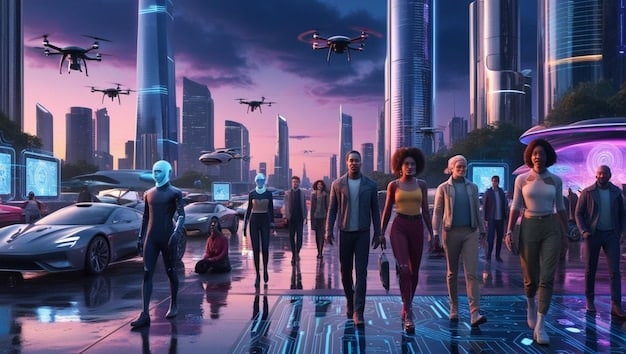Cyberpunk’s Resurgence: Tech of 2025 Fuels Literature’s Dark Renaissance

Cyberpunk’s resurgence in literature is being powerfully shaped by the rapid technological advancements projected for 2025, mirroring and amplifying themes of dystopian societies, artificial intelligence, and the fusion of humanity with technology.
The neon-drenched streets and corporate dystopias of cyberpunk are experiencing a startling renaissance, and the technological landscape of 2025 is poised to fuel this resurgence further. Cyberpunk’s Resurgence: How 2025’s Technological Advancements are Shaping Cyberpunk Literature isn’t just a trend; it’s a reflection of our anxieties and fascinations with the rapidly approaching future.
Cyberpunk’s Enduring Appeal in 2025
Cyberpunk, a genre born from the anxieties of the late 20th century, finds itself surprisingly relevant in 2025. The genre’s exploration of technological overreach, corporate control, and societal fragmentation resonates deeply with contemporary concerns.
The Blurring Lines Between Fiction and Reality
What makes cyberpunk so compelling now is how closely it mirrors our current trajectory. The speculative technologies once confined to fiction are rapidly becoming reality, creating a feedback loop where art imitates life, and life, in turn, is influenced by art.
- AI Ethics: The ethical dilemmas posed by advanced artificial intelligence, a staple of cyberpunk, are now being debated in real-world contexts.
- Cybernetic Augmentation: The prospect of enhancing human capabilities through technology is transitioning from science fiction to practical application.
- Data Privacy: Concerns over data privacy and corporate surveillance, central to cyberpunk narratives, are increasingly prevalent in contemporary society.
This convergence of fiction and reality amplifies cyberpunk’s impact, making it a powerful tool for exploring the potential consequences of our technological choices.

In essence, cyberpunk’s enduring appeal lies in its ability to hold a mirror to our present, reflecting both the promises and perils of unchecked technological advancement. It serves as a cautionary tale, urging us to consider the ethical implications of our creations.
How 2025’s Tech is Fueling Cyberpunk Themes
The technological advancements projected for 2025 are providing fertile ground for new and compelling cyberpunk narratives. These advancements are not merely plot devices; they are catalysts for exploring deeper societal and philosophical questions.
Advanced AI and Sentience
The continued development of artificial intelligence, particularly the pursuit of artificial general intelligence (AGI), raises profound questions about consciousness, identity, and the nature of humanity. Cyberpunk literature is grappling with these questions in increasingly nuanced ways.
- AI Rights: As AI becomes more sophisticated, the debate over AI rights and personhood intensifies, mirroring the struggles for equality in human history.
- Job Displacement: The potential for AI to displace human workers is a recurring theme in cyberpunk, reflecting anxieties about economic inequality and the future of work.
- Algorithmic Bias: Cyberpunk explores the dangers of algorithmic bias, highlighting how AI systems can perpetuate and amplify existing societal inequalities.
These themes are not just theoretical; they are grounded in the real-world challenges of developing and deploying AI responsibly.
Moreover, the fusion of AI with other technologies, such as robotics and biotechnology, creates further narrative possibilities. Imagine sentient robots performing complex surgical procedures or AI-powered virtual assistants capable of manipulating emotions. These scenarios, once relegated to science fiction, are now within the realm of possibility.

Cybernetics and the Transhumanist Dream
Cybernetics, the fusion of humans and machines, is a cornerstone of cyberpunk. The advancements in prosthetics, neural implants, and genetic engineering projected for 2025 are blurring the lines between natural and artificial, raising complex questions about identity and what it means to be human.
The Ethics of Enhancement
While cybernetic enhancements offer the potential to overcome physical limitations and enhance cognitive abilities, they also raise ethical concerns about access, equity, and the potential for creating a technologically stratified society.
- Unequal Access: If cybernetic enhancements are only available to the wealthy, it could exacerbate existing inequalities, creating a divide between the “enhanced” and the “unenhanced.”
- Identity Crisis: The integration of technology into the human body can lead to questions about personal identity and the loss of what it means to be authentically human.
- Technological Dependence: Over-reliance on cybernetic enhancements could make individuals vulnerable to technological failures and hacking attacks.
Cyberpunk literature explores these ethical dilemmas, examining the psychological and social consequences of embracing transhumanist ideals.
Further, the potential for cybernetic enhancements to be used for military or surveillance purposes raises additional concerns about privacy and control. Imagine soldiers with enhanced strength and reflexes or citizens constantly monitored by AI-powered implants. These scenarios highlight the potential for technology to be used to suppress individual freedoms and maintain social control.
Corporate Dominance and Surveillance States
Cyberpunk often depicts a world where powerful corporations exert enormous influence over governments and individuals. The increasing concentration of wealth and power in the hands of a few tech giants, coupled with the proliferation of surveillance technologies, is fueling this theme in contemporary literature.
The Erosion of Privacy
The rise of data analytics, facial recognition technology, and ubiquitous surveillance systems is eroding privacy and empowering corporations and governments to monitor citizens’ every move. This creates a chilling effect on freedom of expression and allows for the manipulation of public opinion.
The Concentration of Power
The consolidation of media outlets, social media platforms, and other information channels in the hands of a few powerful entities allows for the control of narratives and the suppression of dissenting voices. This creates an environment where truth is increasingly subjective and easily manipulated.
Cyberpunk literature explores these themes through narratives of corporate espionage, hacking, and resistance against oppressive regimes. These stories serve as a warning about the dangers of unchecked corporate power and the importance of protecting individual freedoms in the digital age.
Moreover, the increasing reliance on algorithms and automated systems for decision-making raises concerns about accountability and transparency. When algorithms are used to determine loan eligibility, job applications, or even criminal sentencing, it is essential to ensure that they are fair, unbiased, and transparent.
The Role of Virtual Reality and the Metaverse
Virtual reality (VR) and the metaverse, once considered futuristic fantasies, are rapidly becoming mainstream technologies. Cyberpunk literature is exploring the potential impact of these technologies on society, culture, and individual identity.
Escapism and Addiction
VR and the metaverse offer immersive and escapist experiences that can be highly addictive. Cyberpunk explores the dangers of losing oneself in virtual worlds and neglecting real-world responsibilities.
Alternative Identities
VR and the metaverse allow individuals to create and inhabit alternative identities, potentially leading to identity fragmentation and a disconnect from their physical selves.
Cyberpunk literature examines the potential for VR and the metaverse to be used for both positive and negative purposes. On the one hand, they can provide opportunities for creativity, social connection, and personal growth. On the other hand, they can be used for escapism, manipulation, and control.
Furthermore, the integration of VR and the metaverse with other technologies, such as AI and brain-computer interfaces, raises even more profound questions about the nature of reality and the limits of human experience.
Climate Change and Environmental Degradation
While cyberpunk has traditionally focused on technological and social issues, it is increasingly incorporating themes of climate change and environmental degradation. The dystopian visions of polluted cities, resource scarcity, and extreme weather events are becoming increasingly relevant in the face of real-world environmental challenges.
Resource Wars
As resources become scarcer, cyberpunk explores the potential for conflicts over water, energy, and other essential commodities. These “resource wars” could lead to widespread displacement, violence, and social unrest.
Environmental Refugees
Climate change is already displacing millions of people around the world, creating a new class of “environmental refugees.” Cyberpunk explores the challenges faced by these refugees, including discrimination, poverty, and lack of access to basic necessities.
Cyberpunk literature uses these themes to raise awareness about the urgency of addressing climate change and the importance of protecting our planet for future generations. It also highlights the disproportionate impact of environmental degradation on marginalized communities.
Moreover, cyberpunk offers a platform for exploring innovative solutions to environmental challenges, such as sustainable technologies, urban farming, and circular economy models.
| Key Point | Brief Description |
|---|---|
| 🤖 AI Ethics | Exploration of the moral dilemmas posed by advanced AI. |
| 🌐 Corporate Power | Themes of powerful corporations controlling governments and individuals. |
| 💪 Cybernetic Augmentation | Blending humans and machines, questioning identity. |
| 🌍 Climate Change | Incorporation of environmental concerns into dystopian scenarios. |
FAQ
▼
The resurgence is fueled by real-world technological advancements mirroring cyberpunk themes, such as AI ethics, cybernetics, and corporate surveillance, creating a sense of relevance and heightened interest in the genre.
▼
Projected advancements in AI, cybernetics, VR, and surveillance tech provide a canvas for exploring themes of transhumanism, corporate control, privacy erosion, and the blurring lines between reality and digital realms.
▼
Cyberpunk delves into the ethics of AI rights, cybernetic enhancement access, data privacy, algorithmic bias, and the concentration of power in tech giants, prompting discussions about responsibility in tech development.
▼
Cyberpunk increasingly incorporates themes of environmental degradation, resource scarcity, and climate refugees, raising awareness about environmental challenges and their disproportionate impact on marginalized communities.
▼
VR and the metaverse serve as settings to explore escapism, addiction, identity fragmentation, and the potential for both positive social connection and negative manipulation within digital realms.
Conclusion
Cyberpunk’s Resurgence: How 2025’s Technological Advancements are Shaping Cyberpunk Literature showcases a genre not only surviving but thriving in the face of a rapidly changing world. By confronting the potential dangers and unexpected possibilities of our increasingly tech-driven society, cyberpunk continues to challenge, provoke, and ultimately, make us think critically about the future we are creating.





